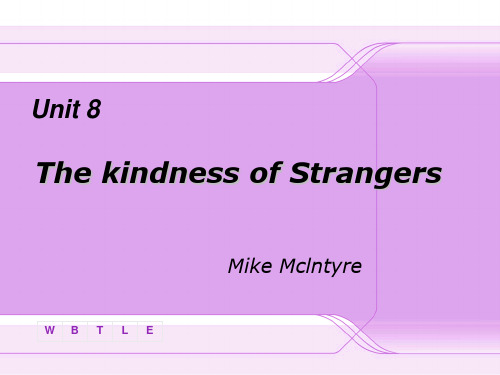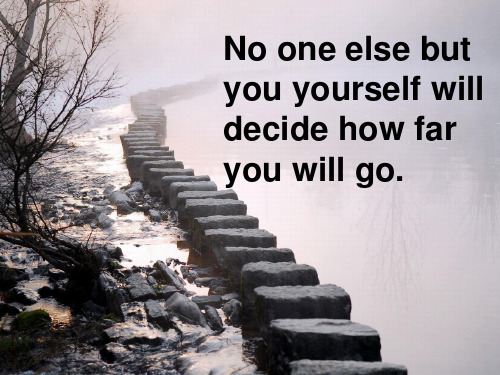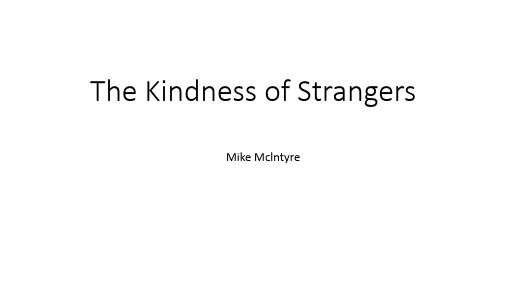The Kindness of Strangers教案
- 格式:doc
- 大小:38.00 KB
- 文档页数:4

BBC英语学习Thekindnessofstrangers有感于陌生人的慈善心怀课文内容Vocabulary:Crowds 词汇:群众How much empathy do you feel towards other people? If you saw someone fall off their bike in traffic, would you stop and help - or just walk away? Many people would givein to apathy, go about their business and just do nothing. So it was a big surprise when about 100 bystanders got together recently to move a bus in east London to help a cyclist trapped under it. A video of the incident went viral on social media.According to Zoheb, a driver who stopped his car to take part in the rescue, about five people gathered to move the bus. He says: "There was no chance we could do it, it was more an invitation for other people to help, really."The initiative paid off. Diners from nearby restaurants joined in. There wasn'tmuch coordination but it didn't take long to develop a collective understanding of what the objective was.Spontaneous collaboration among strangers doesn't happen often. People in a crowd are not sure what to do - they don't have a plan. It's one of the reasons bystanders often do nothing, according to Dr Mark Levine, professor of social psychology at Exeter University in Britain. "The presence of others can inhibit you from helping", he says.The key to positive group behaviour and intervention, Levine explains, "is building a sense of shared identity". Action has to be decided quickly, Levine says. "The longer you leave it, the harder it is to make a decision. If you don't immediately act then youkind of think 'Well, actually I probably couldn't have done anything anyway'."But the people who took the initiative like Zoheb might make a difference. The cyclist ended up in hospital and the images of the collective effort might inspire others to more acts of solidarity.词汇表empathy 感同身受、同情to give in 屈服,让步apathy 冷漠to go about your business 去做自己的事a bystander 旁观者to trap 陷入(出不来),困住to go viral 像病毒一样迅速在网上传播to gather 聚集the initiative 倡议,提议coordination 协调collective 集体的spontaneous 自发的collaboration 合作social psychology 社会心理学to inhibit 抑制intervention 介入,干涉solidarity 团结测验与练习1. 阅读课文并回答问题。


Unit8ThekindnessofStrangersUnit 8 The kindness of strangersMike MclntyreTeaching Objective1. Listening: news and dictation2. Speaking: being kind/warm-hearted3. Vocabulary: accelerator, addict, almighty, amaze, attentive, backpack, brochure, campground, cape, cashless, chamber, chilly, commerce, compassionate, conquer, contrary, cowboy, display, entertain, executive, folk, gamble, gang, goodwill, hitch, intrigue, involved, jerk, kin, knifepoint, lurk, magnificent, motto, murderer, patriotic, pitch, rarely, recall, readiness, renew, revelation, roadside, shabby, skid, solely, stranded, thumb, tone, trucker4. Grammar: -ing participle5. Writing:Being kind can also bring troublesⅠBackground Information1. Reader’s DigestThis article appeared in the Reader’s Digest of May 1997. The Reader’s Digest is a 90-year-old popular American magazine, second only to TV Guide in circulation. It is published in 18 languages and more then 24 million copies are sold monthly worldwide. The large circulation indicates that it is designed to appeal to average people. Therefore, most articles in this magazine reflect traditional American values and tend to paint a generally positive picture of the land and the people of the United States.2. Theme of the storyAmericans are known as a generous people. In recent decades, however, things have changed. People seem to havebecome more and more indifferent to other people’s needs. The crime rate has increased in many places. More and more people are worried about the general moral decay. But the author of this article tries to tell people that based on his personal experience, things are not as bad as they believe. In fact, one can still depend on the kindness of strangers in this country.ⅡWarm-up activities1. 1. Are you willing to help others?2. When you see an old people lying on the ground, will you give him/her a hand?3. Have you ever been moved by what the other did to you?ⅢDetailed study of the textPara 11. come upon---meet, find, or discover by chance or by accidente.g. During the trip, they came upon an unknown animal.2. He had his thumb out and held a gas can in his other hand.cultural notes: usually, it is the usual gesture of hitchhikers when they ask for a free ride. The gas can obviously is meant to explain why he needed this favor. He had run out of gas.3. jerk--- a stupid person who does not care about the effects of his actions4. gang---a group of criminals who work together5. lurk---wait silently and secretly, ready to do wrong6. get/be involved ine.g. This politician is involved in the scandal.Para 27. leave sb/sth done---make sb/sth stay in a certain statee.g. They left the food untouched.8. What bothered me was…I don’t believe what he has said.What he said is true.9. reach the decision---make the decision10. I never even lifted my food off the accelerator.Q: What does this sentence imply?The author was really shocked ---how he could have been so indifferent, so unfeeling and so unsympathetic.Para 311. rely on---depend on12. fellow Americans---other Americans like oneselffellow students/classmates/teachers/workersPara 413. This idea intrigued me.intrigue---interest greatly; fascinate, attractPara 514. The week I turned 37---when is omittedthe day I was born, the year he got married, the night the fire broke out15. take a gamble---take a rest, take a risk, etc.16. through the land of the almighty dollar.the country in which money has as much power as God. The dollar is the most powerful thing/motive17. rest my head---have a rest/sleep18. conquer---overcomePara 619. …and head for the Golden Bridge with a 50-pound pack on my back and a sign displaying my destination to passing vehicles: “America.”Q: Why did the writer put a sign?show where he was going, catch the attention of the media,arouse people’s patriotic feelings.The fact that he put “America” as his destination may have been the reason why he was so well treated.Para 720. hitch---hitchhike21. watch out for---be careful about22. …when it seemed to run contrary to their own best interests.run contrary to---run against; run counter to… when it seemed to be in a way that was opposite to their best interests/when it seeme d to be exactly what they should not have done for their own safety.Para 823. shoulder---an area of ground at the side of the road where drivers can stop their cars if they have some trouble; roadside24. old ladies dressed in their Sunday finest.old ladies who were wearing their best clothes.Q: Where would these two ladies go?on their way to the church or back home from the church25. be supposed to do---should do26. I didn’t know whether to kiss them or scold them for stopping.I di dn’t know whether I should thank them for their kindness or criticize them for running this risk.Q: Does the writer really want to scold/criticize them?No, he just wants to emphasize the kindness and courage of the two old ladies, not to suggest that it was wrong or stupid.27. …she’d rather risk her life than feel bad about……she preferred to risk her life rather than feel guilty aboutbeing indifferent to the passersby. Para 928. locking his brakes---putting on suddenly his brakes29. skid---slid30. robbed at knifepoint---robbed while the robber pointeda knife at himgunpoint31. I hate to see…I don’t want to seee.g. I hate to disturb you, but could you take a look at my computer?I really hate to ask my parents for money.Para 1032. compassionate---feeling sympathy for sb who is suffering; sympathetic33. happen to do---do sth by chance34. Those who had the least to give often gave the most.translate the sentence into Chinese35. invite sb to do sthinvite sb to sth/somewhere36. determine to dobe determined to do, be determinative, make determination to doPara 1137. be grateful to38. touching---moving39. as a matter of course---naturally, as the most natural way to actPara 1240. executive directorCEO41. Now we are talkingThis is used when you think someone’s suggestion is a very good idea.42. tell you what---I’ll tell you whatIt is used when you are suggesting or offering sth.Para 1343. mountain stay-at-home people---people who are happy to stay at home all the time and do not like to do exciting thingsa wait-and-see policy, the next-to-last step, a take-it-or-leave-it attitude, a get-rich-quick dream44. This revelation made my night there all the more special.revelation---sth surprising is suddenly made known to you. Reveal45. all the more special---used for emphasis, which means more special than usualall the more difficult, all the more interestingPara 1446. I… had been scheduled to talk to every class…be scheduled to---be planned that sb will do sth or sth will happene.g. He is scheduled to go to the Great Wall during his visit.47. attentive---paying attention to48. run sb over---hit sb with a car or other vehiclePara 1549. faith---strong belief or trust50. be willing to dobe reluctant to do51. In spite of everything, you can still depend on the kindness of strangers.in spite of---regardless of; despitee.g. In spite of the bad weather conditions we still had a goodharvest.ⅣStructure analysisPart One: (paras. 1-4)an experience of the writer that set him thinking of a trip to find out whether people could still depend on the kindness of strangersPart Two: (paras. 5-13) a description of his journeyPart Three: (paras. 14-15) conclusionⅤExercises。



The Kindness of StrangersMike MclntyreWhy did the author decide to start on this journey?What was the author’s plan for the trip?What did the author learn about people in general during the trip?What was the author’s experience at the Wilson’s?How did he feel when he concluded his journey?Has he found the answer to the question he had in mind?Why did the author decide to start on this journey?What w as the author’s plan for the trip?What did the author learn about people in general during the trip?What was the author’s experience at the Wilson’s?How did he feel when he concluded his journey?Has he found the answer to the question he had in mind?1. One summer I was driving from my home town of Tahoe City, Calif, to New Orleans. In the middle of thedesert, I came upon a young man standing by the roadside. He had his thumb out and held a gas can in his other hand. I drove right by him. There was a time in the country when you' d be considered a jerk if you passed by somebody in need. Now you are a fool for helping. With gangs, drug addicts, murderers, rapists, thieves lurking everywhere, "I don't want to get involved" has become a national motto.2. Several states later I was still thinking about the hitchhiker. Leaving him stranded in the desert did not botherme so much. What bothered me was how easily I had reached the decision. I never even lifted my foot off the accelerator.3. Does anyone stop any more? I wondered. I recalled Blanche DuBois's famous line: "I have always depended onthe kindness of strangers." Could anyone rely on the kindness of strangers these days? One way to test this would be for a person to journey from coast to coast without any money, relying solely on the good will of his fellow Americans. What kind of Americans would he find? Who would feed him, shelter him, carry him down the road?4. The idea intrigued me.5. The week I turned 37, I realized that I had never taken a gamble in my life. So I decided to travel from thePacific to the Atlantic without a penny. It would be a cashless journey through the land of the almighty dollar. I would only accept offers of rides, food and a place to rest my head. My final destination would be Cape Fear in North Carolina, a symbol of all the fears I'd have to conquer during the trip.6. I rose early on September 6, 1994, and headed for the Golden Gate Bridge with a 50-pound pack on my backand a sign displaying my destination to passing vehicles: "America."7. For six weeks I hitched 82 rides and covered 4223 miles across 14 states. As I traveled, folks were alwayswarning me about someplace else. In Montana they told me to watch out for the cowboys in Wyoming, InNebraska they said people would not be as nice in Iowa. Yet I was treated with kindness everywhere I went. I was amazed by people's readiness to help a stranger, even when it seemed to run contrary to their own best interests.8. One day in Nebraska a car pulled to the road shoulder. When I reached the window, I saw two little old ladiesdressed in their Sunday finest." I know you're not supposed to pick up hitchhikers, but it's so far between towns out here, you feel bad passing a person," said the driver, who introduced herself as Vi. I didn't know whether to kiss them or scold them for stopping. This woman was telling me she'd rather risk her life than feel bad about passing a stranger on the side of the road.9. Once when I was hitchhiking unsuccessfully in the rain, a trucker pulled over, locking his brakes so hard heskidded on the grass shoulder. The driver told me he was once robbed at knifepoint by a hitchhiker. "But I hate to see a man stand out in the rain," he added. "People don't have no heart anymore."10. I found, however, that people were generally compassionate. Hearing I had no money and would take none,people bought me food or shared whatever they happened to have with them. Those who had the least to give often gave the most. In Oregon a house painter named Mike noted the chilly weather and asked if I had a coat.When he learned that I had "a light one," he drove me to his house, and handed me a big green army-style jacket.A lumber-mill worker named Tim invited me to a simple dinner with his family in their shabby house. Then heoffered me his tent. I refused, knowing it was probably one of the family's most valuable possessions. But Tim was determined that I have it, and finally I agreed to take it.11. I was grateful to all the people I met for their rides, their food, their shelter, and their gifts. But what I foundmost touching was the fact that they all did it as a matter of course.12. One day I walked into the chamber of commerce in Jamestown, Tenn. to find out about camping in the area.The executive director, Baxter Wilson, 59, handed me a brochure for a local campground. Seeing that it cost $12,I replied, "No, that's all right. I'll try something else." Then he saw my backpack. "Most people around here willlet you pitch a tent on their land, if that's what you want," he said. Now we're talking, I thought. "Any particular direction?" I asked. "Tell you what. I've got a big farm about ten miles south of here. If you're here at 5:30, you can ride with me."13. I accepted, and we drove out to a magnificent country house. Suddenly I realized he'd invited me to spend thenight in his home. His wife, Carol, a seventh-grade science teacher, was cooking a pot roast when we walked into the kitchen. Baxter explained that local folks were "mountain stay-at-home people" who rarely entertained in their house. "When we do," he said, "it's usually kin." This revelation made my night there all the more special.14. The next morning when I came downstairs, Carol asked if I'd come to their school and talk to her class aboutmy trip. I agreed, and before long had been scheduled to talk to every class in the school. The kids were attentive and kept asking all kinds of questions: Where were people the kindest? How many pairs of shoes did you have?Did anybody try to run you over? Did you fall in love with someone? What were you most afraid of?15. Although I hadn't planned it this way, I discovered that a patriotic tone ran through the talks I gave thatafternoon. I told the students how my faith in America had been renewed. I told them how proud I was to live ina country where people were still willing to help. I told them that the question I had had in mind when I plannedthis journey was now clearly answered. In spite of everything, you can still depend on the kindness of strangers. Please recite the following passage.The lives of most men are determined by their environment. They accept the circumstances amid which fate has thrown them not only with resignation but even with good will. They are like streetcars running contentedly on their rails and they despise the sprightly flitter that dashes in and out of the traffic and speeds so jauntily across the open country. I respect them;they are good citizens,good husbands,and good fathers,and of course somebody has to pay the taxes;but I do not find them exciting. I am fascinated by the men,few enough in all conscience,who take life in their own hands and seem to mould it to their own liking. It may be that we have no such thing as free will,but at all events,we have the illusion of it. At a crossroad it does seem to us that we might go either to the right or to the left and,the choice once made, it is difficult to see that the whole course of the world's history obliged us to take the turning we did.。